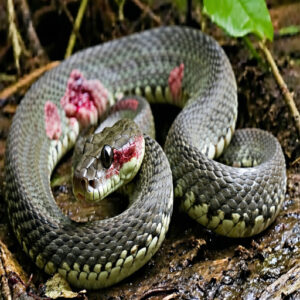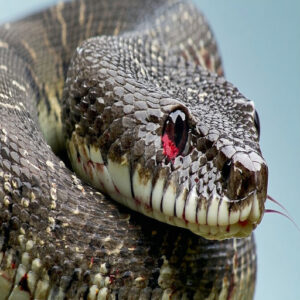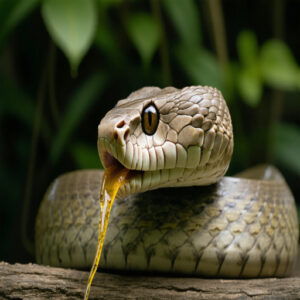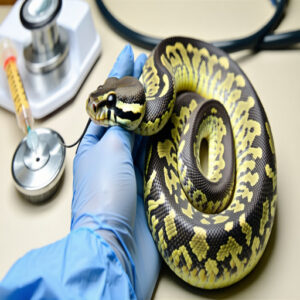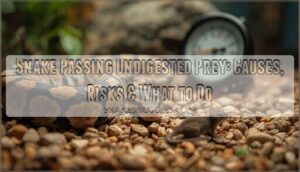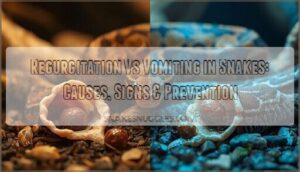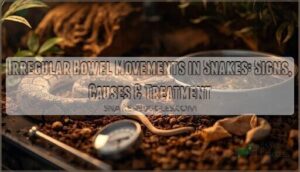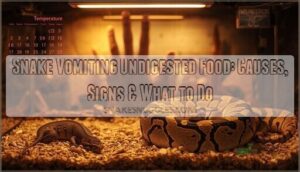This site is supported by our readers. We may earn a commission, at no cost to you, if you purchase through links.

Watch for lethargy, excessive hiding, or unusual limpness—these can mean it’s unwell.
Visible weight loss, like a thinning tail or bony spine, often accompanies appetite loss.
Check for dehydration signs, such as dry, stuck skin or cracked eye caps.
Respiratory issues, like wheezing, open-mouth breathing, or mucus, are red flags.
Blisters, inflamed scales, or discoloration could point to infections.
Even subtle changes, like abnormal resting positions or stargazing (unusual head tilts), are worth noting.
If you’re spotting these signs, swift care is essential—your scaly friend’s health depends on it.
Table Of Contents
- Key Takeaways
- Sick Snake Behavior Signs
- Physical Signs of Illness
- Common Health Issues
- Veterinary Care and Prevention
- Recognizing Specific Health Issues
- Frequently Asked Questions (FAQs)
- When should I worry about my snake not eating?
- How to help a snake that won’t eat?
- How to tell if a snake is starving?
- How do you stimulate a snake to eat?
- Can stress cause a snake to stop eating?
- How do seasonal changes affect snake feeding?
- Could snake medications impact their appetite?
- Does the type of prey influence food refusal?
- What role does enclosure size play in feeding?
- Conclusion
Key Takeaways
- Watch for lethargy, excessive hiding, or unusual postures in your snake as these often signal illness.
- Check for dehydration, weight loss, or skin issues like stuck shedding or inflamed scales, as these are clear warning signs.
- Breathing problems like wheezing, open-mouth breathing, or nasal discharge may point to respiratory infections needing immediate attention.
- If your snake refuses food for weeks combined with other unusual symptoms, consult a reptile vet promptly to address potential health concerns.
Sick Snake Behavior Signs
When your snake isn’t behaving like its usual curious self, it’s often a sign that something’s wrong.
Watching for unusual behaviors like lethargy, hiding excessively, or odd postures can help you catch potential health issues early, and noticing unusual behaviors is key to early detection.
Lethargy and Decreased Activity
When your snake seems unusually sluggish, it might be more than just a lazy day.
Lethargy and decreased activity could signal illness.
Watch for:
- Inconsistent movement patterns, like barely exploring its tank.
- Abnormal resting habits, such as hiding excessively or lying limp.
- Energy loss, especially if paired with refusal to bask.
Lethargy often points to serious underlying issues needing attention.
Loss of Appetite and Weight
Sometimes, what starts as mild lethargy spirals into visible appetite loss.
A snake not eating for weeks is waving a flag—watch closely for other starvation symptoms like weight loss along its spine or a thinning tail.
Feeding habit changes can mean stress, illness, or parasites.
Food refusal signs shouldn’t be ignored; they often reveal major health concerns needing quick attention.
Dehydration and Skin Conditions
Dehydration in snakes isn’t just about thirst—it shows up in their skin too.
Watch for skin lesions, stuck patches of dry shedding, or scales seeming rough and crusty.
Scale rot and blister symptoms, like inflamed belly scales, scream trouble.
Cracked eye caps and muscle loss add to dehydration signs.
Prolonged dehydration can be fatal, so learn how to recognize and address this critical snake health issue.
Proper hydration keeps snake skin healthy and avoids shedding problems entirely, learn more at critical snake health issue.
Respiratory Problems and Stomatitis
Breathing difficulties could signal snake pneumonia or a respiratory infection.
Look for open-mouth breathing, mucus, or wheezing.
Several factors can contribute to these infections, including inadequate husbandry and underlying health issues, according to this overview of reptile respiratory infections.
Mouth infections, like infectious stomatitis, may cause mouth rot or signs like swollen gums or thick pus.
Watch for these three red flags:
- Loss of appetite with labored breathing.
- Open-mouth breathing and airway blockage.
- Swollen mouth tissues and pus-filled discharge.
Physical Signs of Illness
You’ll notice a sick snake’s health by changes in its physical appearance, like loose scales, swelling, or discoloration.
These signs often point to underlying issues that need your immediate attention to prevent complications, which can be indicated by physical appearance.
Loose Scales and Swelling
Loose scales or swelling might point to serious issues like scale rot or snake blistering, often caused by a damp, dirty habitat.
Keep an eye out for red, pink, or swollen belly scales and any unusual skin condition.
Tail swelling could signal infections or shedding problems.
Address improper care fast—cleaning the enclosure prevents worsening scale infections or painful skin lesions.
Lesions and Discoloration
Finding loose scales may lead you to notice lesions or discoloration.
These issues often signal infections, burns, or parasites impacting your snake’s health.
Watch for:
- Discoloration patterns, like uneven dark patches or red streaks.
- Blister symptoms resembling small fluid-filled pockets along its body.
- Scale damage, such as peeling or raw spots with sensitive skin underneath.
Check these signs early to prevent worsening conditions.
Abnormal Odors and Discharge
Unusual odors and discharge may hint at deeper health concerns.
A foul smell could stem from infections, like fungal issues, affecting the snake’s skin or mouth condition.
Respiratory distress in snakes, often signaled by open-mouth breathing or nasal discharge, can be further investigated through this guide to respiratory issues.
Watch for snake discharge, such as nasal discharge or thick mucus, often paired with open-mouth breathing, as these odor causes signal trouble—don’t ignore them, and addressing abnormal smells quickly can prevent worsening of your snake’s illness.
Common Health Issues
Your snake’s health can be affected by a range of issues, from respiratory infections to nutritional deficiencies. Recognizing these problems early helps you address them before they become life-threatening.
Respiratory Infections and Parasites
If your snake isn’t eating, parasites or a respiratory infection could be to blame.
Look for these signs:
- Breathing issues, like wheezing or open-mouth breathing.
- Infection symptoms, including nasal mucus or swollen bodies.
- Snake pneumonia, from poor humidity or temperature.
- Parasite control neglect, leading to mites or worms.
- Loss of appetite tied to these health problems.
Act fast!
Bacterial and Fungal Infections
Bacterial and fungal infections are no joke for your scaly friend.
Fungal spores thrive in damp enclosures, while bacterial cultures crank up if hygiene slips.
These infections can cause skin lesions, swelling, or even respiratory infection.
Watch for a snake illness marked by lethargy or loss of appetite.
Quick action keeps the microbial balance intact—don’t let antibiotic resistance win!
| Symptom | Potential Cause |
|---|---|
| Skin lesions | Fungal spores |
| Swelling | Bacterial infections |
| Lethargy | Persistent infection |
| Loss of appetite | Worsening condition |
Metabolic Bone Disease and Deficiencies
Struggling to shed or refusing food? It could be metabolic bone disease from calcium and vitamin D3 deficiencies.
Watch for:
- Bone deformities (soft or brittle bones).
- Lethargy and weak posture.
- Snout or spine swelling, a clear red flag.
- Loss of appetite, often tied to nutrient imbalance.
For readily available options, explore suitable snake calcium supplements.
Use proper lighting, mineral supplements, and a balanced diet to avoid snake calcium deficiency and these issues.
Veterinary Care and Prevention
You can’t overlook the importance of regular vet visits and preventive care in regard to keeping your snake healthy.
A clean environment, proper husbandry, and early treatment for illnesses make all the difference in avoiding serious health issues.
Regular Examinations and Treatment
If your snake’s symptoms, like loss of appetite or unusual behavior, linger, it’s time for a veterinary consultation.
Investing in essential snake vet checkup supplies can also contribute to your snake’s well-being.
Regular check-ups catch snake illnesses early, and your vet’s medical diagnosis helps identify issues you might miss.
Treatment plans, from medications to snake rehabilitation, can save lives.
Keep monitoring snake health—it’s the best way to guarantee your pet thrives over the years.
Proper Environment and Hygiene
A stressed snake, often hiding or refusing food, might be battling poor hygiene or an improper environment.
Focus on Clean Enclosures, maintaining Humidity Control and Temperature Management, and using the right Substrate Quality to prevent issues like improper shedding.
Regular Sanitation Practices guarantee a healthy snake habitat.
Using effective snake enclosure cleaners is vital for maintaining a hygienic environment.
A spotless, balanced enclosure reduces illness risks and promotes better appetite.
Annual Check-ups and Preventative Medicine
Keeping up with annual check-ups helps catch snake symptoms early, like loss of appetite or respiratory issues.
Preventive care, like Vaccine Schedules and Health Screening, paired with Medical Histories, helps your snake’s health stays on track.
Finding a qualified reptile veterinarian is vital for specialized care and advice.
Diagnostic tools can spot hidden problems before they show up as a sick snake, and prevention beats scrambling over snake illness later.
Recognizing Specific Health Issues
When your snake suddenly stops eating, it could point to serious health issues like respiratory problems or dehydration.
Recognizing these specific signs early, such as mouth rot or unusual postures, can help you address the problem before it worsens.
Respiratory Problems and Dehydration
When your snake isn’t eating, respiratory problems or dehydration might be at play.
Look for these warning signs:
- Breathing difficulties like wheezing or open-mouth breathing may point to respiratory infection or even Snake pneumonia.
- Dehydration signs include sunken eyes and dry, flaky skin.
- Persistent lethargy could signal respiratory failure or airway obstruction demanding urgent care.
Mouth Rot and Constipation
Mouth infections like mouth rot can cause swelling, thick mucus, and loss of appetite.
Ever notice your snake rubbing its mouth excessively? That’s often a red flag.
Constipation or impaction in snakes, linked to gut health, shows up as bloating and lethargy.
A blocked gut might even resemble scale issues.
These feeding problems signal snake illness needing quick care.
Understanding boa constrictor health is vital for identifying early warning signs of mouth rot and other diseases.
Inclusion Body Disease and Abnormal Postures
Watch for abnormal postures, like a snake holding its head up awkwardly or struggling to move, as these can signal Inclusion Body Disease (IBD).
This serious neurological issue often brings muscle weakness, abnormal movement, and even lethargy.
If paired with loss of appetite or other disease symptoms, seek a reptile vet immediately.
Acting fast can protect your snake’s health, and it is crucial in cases of serious neurological issue or when you notice abnormal postures.
Frequently Asked Questions (FAQs)
When should I worry about my snake not eating?
When dinner invitations keep getting declined, it’s time to dig deeper.
If your snake hasn’t eaten for weeks, seems lethargic, or shows weight loss, consult a reptile vet—hidden health issues might be at play.
How to help a snake that won’t eat?
Offer smaller prey, adjust the enclosure’s temperature and humidity, and reduce handling to lower stress.
If your snake still won’t eat, consult a reptile vet—sometimes it’s more than a picky eater issue!
How to tell if a snake is starving?
Look for weight loss, prominent bones along the spine, loose skin, and decreased energy.
If your snake hasn’t eaten in a while and looks thinner or lethargic, it’s time to consult a reptile vet.
How do you stimulate a snake to eat?
Try warming its prey slightly to mimic a fresh kill, or offer smaller prey if it’s overwhelmed.
Create a quiet, stress-free environment, and guarantee proper temperatures and humidity—it’s like setting the perfect dinner mood with the right temperatures.
Can stress cause a snake to stop eating?
It’s no surprise that stress can make your snake turn down dinner.
Changes in habitat, excessive handling, or tank-mates can overwhelm them, affecting appetite.
Creating a stable, quiet environment helps restore their comfort—and their appetite.
How do seasonal changes affect snake feeding?
Changing seasons can mess with a snake’s appetite, especially during cooler months when brumation kicks in.
It’s like hibernation-lite—lower activity, reduced metabolism, and appetite drops.
Warmer conditions often get them back to their usual feeding.
Could snake medications impact their appetite?
When medications enter the mix, it’s like throwing a curveball at your snake’s appetite.
Certain drugs—like antibiotics or antiparasitics—may reduce hunger temporarily, but always check with your vet if appetite loss lingers too long, and consider the impact of medications on your snake’s overall health.
Does the type of prey influence food refusal?
Yes, the prey type matters.
Offering a snake frozen-thawed instead of live, prey that’s too large, or unfamiliar species can trigger food refusal.
Switching prey types or properly preparing meals often solves this picky eater dilemma.
What role does enclosure size play in feeding?
Picture trying to enjoy dinner in a closet—claustrophobic, right?
An enclosure that’s too small can stress snakes, limiting their movement and sense of safety, which might make them refuse food.
Give them space to thrive!
Conclusion
A sick snake not eating can seem like a small ripple in calm water, but it often signals deeper health concerns.
Watch closely for signs like lethargy, dehydration, or respiratory issues, as these may point to illness.
Address weight loss, skin problems, or unusual behavior immediately.
Keeping their habitat clean and conditions ideal plays a huge role in preventing issues.
If symptoms persist, don’t wait—reach out to a vet, as your snake’s well-being depends on your proactive care.
- https://www.petmd.com/reptile/care/evr_rp_how-can-i-tell-if-my-snake-sick
- https://mysnakepet.com/signs-of-a-sick-snake/
- https://www.myfamilyvets.co.uk/snake-health-problems
- https://www.thesprucepets.com/what-to-do-if-your-snake-is-not-eating-1238176
- https://vcahospitals.com/know-your-pet/snakes-diseases


